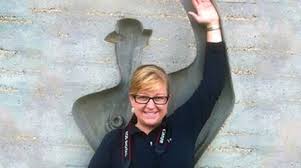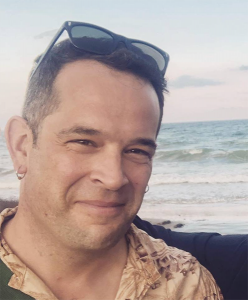Danielle Willkens
 Danielle Willkens Assoc. AIA, FRSA, LEED AP BD+C is a practicing designer, researcher, and FAA Certified Remote Pilot who is particularly interested in bringing architectural engagement to diverse audiences through interactive projects. Her experiences in practice and research include design/build projects, public installations, and on-site investigations as well as extensive archival work in several countries.
Danielle Willkens Assoc. AIA, FRSA, LEED AP BD+C is a practicing designer, researcher, and FAA Certified Remote Pilot who is particularly interested in bringing architectural engagement to diverse audiences through interactive projects. Her experiences in practice and research include design/build projects, public installations, and on-site investigations as well as extensive archival work in several countries.
Lecture and Workshop
Lecture
Designing Documentation. Survey & Visualization Techniques for Heritage Sites
Date: Thursday, Nov. 12
Time: 11:00 to 12:30 p.m. (PST)
Lecture Recording
This presentation will explore an amalgamation of analog and 3D digital data collection (LiDAR, UAVs, 3D cameras) for heritage site documentation and preservation planning. Beyond testing digital methodologies and workflows, this ongoing research investigates how multidisciplinary teams of designers, historians, cultural resource managers, and construction technology specialists can meld the physical and virtual to bring enhanced historic interpretation historic sites.
Workshop
Designing Documentation: Photogrammetry Tools and Techniques
Date: Friday, Nov. 13
Time: 11:00 to 12:30 p.m. (PST)
WORKSHOP REcording
This workshop will be an interactive demonstration of techniques for terrestrial and aerial photogrammertry for documentation and digital modeling. Our work will explore a variety of scales and participants will be provided with content prior to the workshop, instructions for capturing a content, a test data set, and links for downloading agistoft metapshape (free 30-day trial).
Stephen Whiteman
 Stephen Whiteman is Senior Lecturer in the Art and Architecture of China at The Courtauld Institute of Art, University of London, and is the keynote lecture for the series. His research and teaching focus on the visual and spatial cultures of early modern China in their global contexts. Stephen is co-author of Thirty-Six Views: The Kangxi Emperor’s Mountain Estate in Poetry and Prints (Dumbarton Oaks, 2016), which received the John Brinkerhoff Jackson Book Prize in 2017, and Floating Time: Chinese Prints, 1954–2002 (Power, 2016). His new book, Where Dragon Veins Meet: The Kangxi Emperor and His Estate at Rehe, was published by University of Washington Press earlier this year. Prior to The Courtauld, he taught at the University of Sydney.
Stephen Whiteman is Senior Lecturer in the Art and Architecture of China at The Courtauld Institute of Art, University of London, and is the keynote lecture for the series. His research and teaching focus on the visual and spatial cultures of early modern China in their global contexts. Stephen is co-author of Thirty-Six Views: The Kangxi Emperor’s Mountain Estate in Poetry and Prints (Dumbarton Oaks, 2016), which received the John Brinkerhoff Jackson Book Prize in 2017, and Floating Time: Chinese Prints, 1954–2002 (Power, 2016). His new book, Where Dragon Veins Meet: The Kangxi Emperor and His Estate at Rehe, was published by University of Washington Press earlier this year. Prior to The Courtauld, he taught at the University of Sydney.
Digital Art History Lecture and Workshop
Lecture
Beyond the Perspectival Paradigm: Digital Challenges to Art History
Date: Tuesday, October 20
Time: 11:00 to 12:30 p.m. (PST)
Lecture Recording
Originally developed in antiquity and rediscovered in Renaissance Europe, linear perspective has, over the intervening centuries, become intertwined with modernist trajectories and effectively equated with natural vision, popular and scholarly elisions that leave the cultural specificity of both vision and pictorial technologies untroubled. During the early modern period, however, the mobility of images and individuals spread the underlying principles of linear perspective across Eurasia, where the technology was astutely perceived and strategically adapted to endogenous and novel pictorial forms alike. Taking View of Rehe (ca. 1710), a monumental hanging scroll by the Qing dynasty court painter Leng Mei, as its focus, this paper uses a combination of formal and comparative analysis and digital tools, including GIS and three-dimensional spatial modelling, to explore the mathematical and technical means by which perspective was adapted and incorporated outside Europe. By countering Eurocentric assumptions about both what constituted “perspective” in the early modern world and the cultural specificity of the software with which we work, this paper suggests ways in which digital tools both allow and compel re-examination of core art historical questions and cultural assumptions, advancing decentred understandings of the past and present.
Workshop
Generative Landscapes: Sources, Stratigraphy, and Close Reading in Early Modern China and Beyond
Date: Thursday, October 22
Time: 11:00 to 12:30 p.m. (PST)
WORKSHOP RECORDING
As objects of historical enquiry, landscapes and the environment offer particular opportunities and challenges. Like other forms of architectural space, landscapes represent complex, multifaceted expressions of individual and collective imagination and experience. Frequently mediated and remediated through a variety of visual and literary forms that take on independent status in our conceptions of space, landscape as an artistic genre both stabilises and elides the ephemerality of real sites. The natural reality of gardens and designed landscapes as places of constant change similarly confounds research into their aesthetics and experience, as archives and accounts, where they exist, are necessarily fragmentary relative to the organic object they purport to describe. This workshop explores these problems through the lens of one particular eighteenth-century imperial estate, focusing on digital mapping as a medium for engaging disparate sources in reconstructing design and use of the site. Seeking to extend the idea of object-centred research to spatial analysis, the workshop invites discussion of how landscapes may be engaged to generate their own stories, and how this, in turn, may aid in countering dominant narratives in our studies of art and architecture.
This Speaker Series is supported by the Department of Creative Studies.
 Danielle Willkens Assoc. AIA, FRSA, LEED AP BD+C is a practicing designer, researcher, and FAA Certified Remote Pilot who is particularly interested in bringing architectural engagement to diverse audiences through interactive projects. Her experiences in practice and research include design/build projects, public installations, and on-site investigations as well as extensive archival work in several countries.
Danielle Willkens Assoc. AIA, FRSA, LEED AP BD+C is a practicing designer, researcher, and FAA Certified Remote Pilot who is particularly interested in bringing architectural engagement to diverse audiences through interactive projects. Her experiences in practice and research include design/build projects, public installations, and on-site investigations as well as extensive archival work in several countries. Stephen Whiteman is Senior Lecturer in the Art and Architecture of China at The Courtauld Institute of Art, University of London, and is the keynote lecture for the series. His research and teaching focus on the visual and spatial cultures of early modern China in their global contexts. Stephen is co-author of Thirty-Six Views: The Kangxi Emperor’s Mountain Estate in Poetry and Prints (Dumbarton Oaks, 2016), which received the John Brinkerhoff Jackson Book Prize in 2017, and Floating Time: Chinese Prints, 1954–2002 (Power, 2016). His new book, Where Dragon Veins Meet: The Kangxi Emperor and His Estate at Rehe, was published by University of Washington Press earlier this year. Prior to The Courtauld, he taught at the University of Sydney.
Stephen Whiteman is Senior Lecturer in the Art and Architecture of China at The Courtauld Institute of Art, University of London, and is the keynote lecture for the series. His research and teaching focus on the visual and spatial cultures of early modern China in their global contexts. Stephen is co-author of Thirty-Six Views: The Kangxi Emperor’s Mountain Estate in Poetry and Prints (Dumbarton Oaks, 2016), which received the John Brinkerhoff Jackson Book Prize in 2017, and Floating Time: Chinese Prints, 1954–2002 (Power, 2016). His new book, Where Dragon Veins Meet: The Kangxi Emperor and His Estate at Rehe, was published by University of Washington Press earlier this year. Prior to The Courtauld, he taught at the University of Sydney.